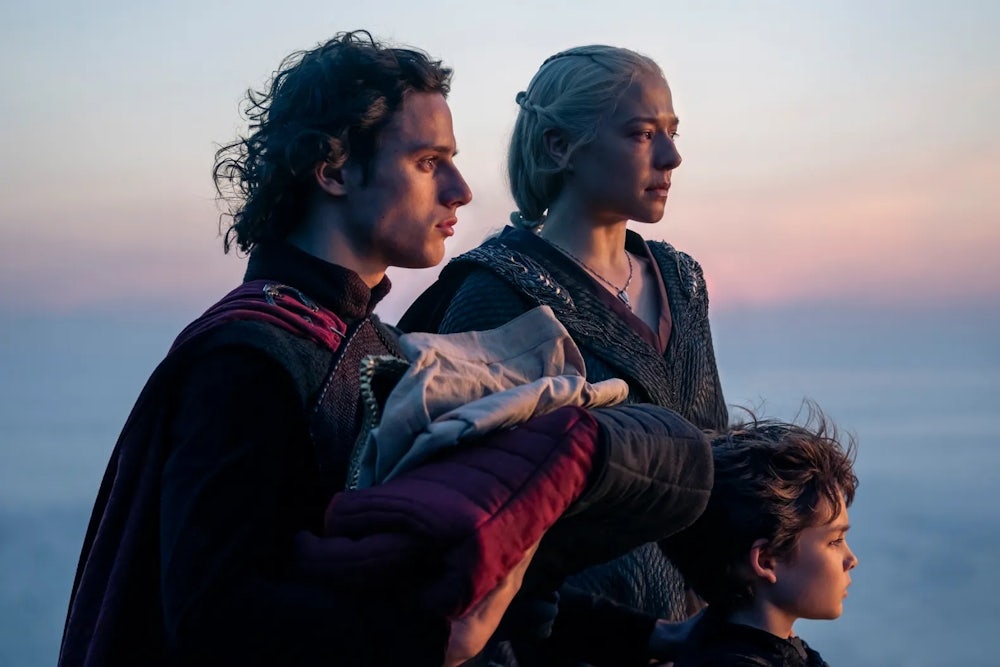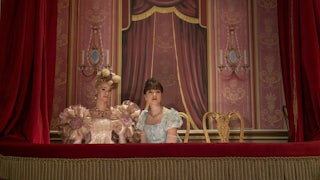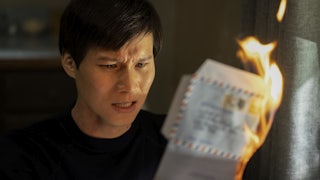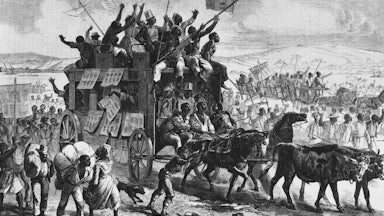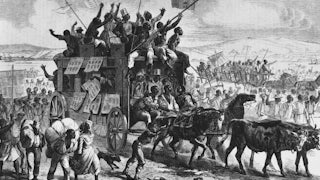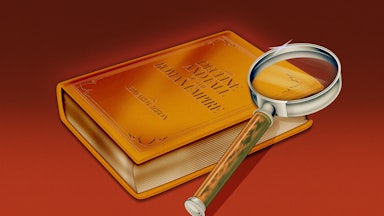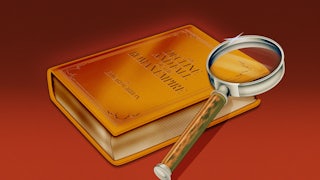Back in 2013, Game of Thrones created a vast televisual world. Much of that world it populated with useful bodies. Dozens of undifferentiated, naked bodies of women, writhing around as an occasion to explain the complexities of the plot or demonstrate the relative virtue of the men put within striking distance of them; thousands of undifferentiated, nearly naked bodies of brown men, ready to be slaughtered or set free; thousands more men in armor, differentiated only by the crests on their shields and flags, ready to get mowed down by dragons and swords or to do the mowing themselves. The ultimate threat of the series—the White Walkers, who wanted to turn all of Westeros into nameless, undifferentiated ice zombies—was not really a threat to these heaving masses of bodies, who, within the universe of the show, were already just as nameless and undifferentiated as the Armies of the Night.
The White Walkers, however, were a threat to the vast ensemble cast of the show. These were characters who struggled to make or earn or even keep their names, for whom anonymity was a fate worse than death. And these were the ones we grew to love. The Faustian bargain of Game of Thrones was that, for all of its stereotyping and objectification of the teeming masses at the margins of its tale, it also gave us one of the largest, deepest, most fastidiously constructed, and terrifically acted ensembles ever assembled on television.
Part of what made the show’s controversial final seasons such a disappointment is that the show’s writers seemed to abandon its violently patient and theatrically unsentimental storytelling ethos in favor of a sped-up exposition dump. The fact that so many beloved characters became the Drawing of a Horse meme in the latter episodes only felt so frustrating because those characters—and dozens of others—had been pieced together slowly, bit by bit, scene by scene over an impossibly long period of time. The show is as propulsive as you remember, the cliff-hangers just as steep, but the amount of work the show put into developing its ensemble at the very beginning is a marvel (and increasingly a rarity in contemporary series). Following the lead of George R.R. Martin’s novels, Game of Thrones was simply interested in way more characters than an average show would be.
And that’s why killing them was such a big deal. The show created a world with dozens of featured characters, numerous overlapping plotlines, schemes upon schemes and mysteries upon mysteries. Anybody could be important, any claim to the throne could be the claim or one that gets snuffed out in an instant. For whatever else happened to the series in its later days, the feat of creating this massive, deliberately unstable narrative economy, and then somehow addicting us all to it, is one that remains unparalleled.
If the hallmark of Game of Thrones was its wanton expansiveness, its virtuosically conducted sprawl, its prequel series, House of the Dragon, is defined by its narrow efficiency. Rather than an unceasingly curious story of all seven kingdoms, this is the story of one. There are surprises and reversals of fortune and devastating beheadings, all the same, but the stakes are clear and the players are all predictably in place. We may not know the details yet, but we know, in ways large and small, where this is going. House of the Dragon pretends this is not the case, drafting off the memory of its forebear’s ambition. But its scale is undeniably smaller, its degree of difficulty sneakily lower. For all those reasons, though, it’s also a distinctly satisfying weekly serial, as long as you don’t ask too much of it.
All four seasons of Succession took place over a period of about two years. The final season proceeds at a one-day-per-episode pace, and it accounts for just under two weeks in the lives of the Roys. On the other hand, the first season of House of the Dragon—HBO’s other prestige succession drama—covers nearly 20 years in eight episodes. That’s fast! So fast, in fact, that it necessitated replacing its two lead roles—the embattled heir Rhaenyra Targaryen and her frenemy-stepmother Alicent Hightower—midseason. There’s a towheaded baby in episode 4 who is an adult king by episode 8. The drawbacks to this gambit are obvious. Despite the excellence of all four actors playing our two leads—Milly Alcock and Emma D’Arcy as young and old Rhaenyra and Emily Carey and Olivia Cooke as young and old Alicent—the show’s narrative speed is a debilitating constraint. You can’t slow-play character development across three time jumps in eight hours.
All this first-season hustling, presumably, was done in the service of the new season we now have. Hurrying through all that table-setting, throwing child actors overboard as it went, would buy the second season the luxury of time. But, whether it’s because of the show’s deliberate narrowness of focus or because the show’s writers simply got used to that brisk and sketchy style, the new season struggles to match the depth of Game of Thrones. It is a gruesome, dour, often entertaining, recitation.
House of the Dragon takes place roughly a hundred years before the events of Game of Thrones, during a period of internecine palace intrigue known as “The Dance of the Dragons.” King Viserys Targaryen (Paddy Considine) has a daughter, but no male heirs. After his beloved wife dies in childbirth, he names his only daughter, Rhaenyra, heir. But, as we know, glass ceilings are hard to break, and the pending succession of a female monarch to the Iron Throne causes a tremendous amount of uproar across the kingdoms. In the meantime, Viserys takes a second wife, Alicent, who bears him several sons. Although he publicly holds to Rhaenyra as his successor, once Viserys dies, there’s a scramble, Alicent’s son Aegon (Tom Glynn-Carney) takes the throne, and Rhaenyra flees King’s Landing as the queen in exile. In the season’s dramatic finale, one of Alicent’s sons (accidentally?) kills one of Rhaenyra’s sons, and the civil war that had been long brewing seems, officially, to have begun.
So we open this new season with the relative confidence that, whatever else happens, at minimum, our characters will remain roughly the same age. But that stability does not exactly prompt a shift in the show’s narrative approach. As we return, Rhaenyra is hunkered down at Dragonstone—the Targaryen family seat—with her shitty husband-uncle Daemon (Matt Smith). Alicent, meanwhile, is trying to hold it together in King’s Landing with her shitty son Aegon on the throne. This split scenario serves to further simplify the show’s landscape—the marketing campaign for this season has centered on the color-coded rivalry between Rhaenyra and Alicent, Team Black and Team Green. But it also somehow renders the series’s central conflict more remote.
The show’s most animating relationship has always been the one between Rhaenyra and Alicent. Perhaps the show’s greatest achievement was the seamless hand-off of tension and chemistry between Alcock/Carey and D’Arcy/Cook. This season sees them almost entirely separated. While necessary for the machinations of the plot, you can feel the lack of their on-screen electricity. In its place, there are lots of dragons, but their individual personalities end up tethered pretty closely to those of their sworn riders, many of whom are themselves somewhat interchangeable. (One of the heirs on Team Green—a fearsome strategist named Aemond, played by Ewan Mitchell—wears an eyepatch, and, while there’s plenty of plot tied up in that ocular injury, the patch also helps us tell him apart from all the other sadistic, flaxen-haired princelings on-screen.) And a series once powered by the nuclear fusion reaction between these two actors is left running on the charge of lesser players. Game of Thrones was filled with elite-level schemers running plots within plots; much of the second season of House of the Dragon consists of either Rhaenyra or Alicent sitting in a room filled with people who are substantially stupider than they are. It’s a tiring pattern, for them and for us as viewers.
Relatedly, much of the action of these early episodes of season 2—four episodes were provided for review—is about poorly conceived tactical operations. There are various covert, terroristic plans, carried out in the hopes of either staunching or stoking a broader conflict. There are one or two fascinating debates in which the metaphor of dragon power as nuclear power comes startlingly close to the surface. There are distractions and diversions: Rhaenyra keeps disappearing; Daemon takes a long, strange trip to a uniquely inhospitable castle keep; and we even take a quick visit to the wall to see about some Starks. But, when given the chance to build out new characters or deepen ones we already know, invariably, the series casts back to material we already know from our own past voyages in Westeros. The young Aegon’s impish impetuousness and naïveté eerily recall that of Joffrey Baratheon, and the slinky Larys Strong is a funhouse mirror of a later Master of Whispers Lord Varys—their names even rhyme! I’d be lying if I said that, in the moment, these characterizations didn’t land with a similar resonance and tickle the same fancies they did back in the 2010s. But when the credits roll, the whole thing begins to feel recycled, referential rather than original. This story began as a footnote, and House of the Dragon has yet to prove itself as more than an annotation.
In some ways, the show’s overriding theme is also the reason it can never fully succeed on its own terms. House of the Dragon is about the strangeness and danger of investing transcendent narratives and transhistorical power in people who’ve simply stumbled into the inheritance of such narrative and such power. A good king is an accident, a bad king an inevitability. The gender swapping that sets this show’s plot in motion isn’t revolutionary so much as it is simply revisionist. To grow up, to grow into a preordained institutional destiny is a deranging thing, both for the inheritors and for the observers who behold this lunacy for what it is.
That the story matters more than the individual people who fleetingly embody it is a structuring theme of both Game of Thrones and House of the Dragon. The former series, though, was built to resist that logic from a stylistic point of view. It insisted that these people mattered despite or even because of their disenfranchisement. House of the Dragon, which not incidentally stays mostly within the confines of the royal family, has had more trouble resisting. With few exceptions—the aforementioned Rhaenyra and Alicent, as well as Matt Smith’s hideously vapid Daemon—most of the characters we meet serve only to thinly symbolize the events of which they are a part. The show can sometimes feel like an educational puppet show performed in an assembly at the King’s Landing Public School District to teach distractible fourth graders about Westerosi history.
The TV scholar Michael Z. Newman once elegantly described the serial “arc” as “plot stated in terms of character.” We absorb the complexity of our TV stories by becoming invested in the characters who embody them, not just Jon Snow and Daenerys, but Podrick and the Sea Snakes and whoever else glides or stumbles through the scene. Character development, in other words, isn’t ancillary to the telling of a great story; it’s the means through which a great story is told. House of the Dragon can be a fun ride. The dragons look cool, the chess moves can be engaging, and, as someone who hasn’t read these books or their appendices, I’m frequently surprised by the positions they end up in. But the show simply hasn’t done enough work—by choice and by constraint—to create a world that’s substantially independent from the one that its ancestor built. As the heir to one of the great empires of twenty-first-century television, House of the Dragon’s job was simply to secure that valuable inheritance, not necessarily do anything with it.
